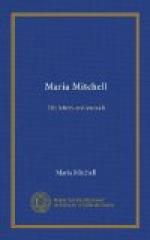“Madame Struve spoke German, Russian, and French, and complained that she could not speak English. She said that she had spent three weeks with an English lady, and that she must be very stupid not to speak English.
“I noticed that in one of the rooms, which was not so very immense, there was a circular table, a small centre-carpet, and chairs around the table; I have been told that ‘in society’ in Russia, the ladies sit in a circle, and the gentlemen walk around and talk consecutively with the ladies,—kindly giving to each a share of their attention.
“They assured me that the winters were charming, the sleighing constant, and the social gatherings cheery; but think of four hours, only, of daylight in the depth of the winter. Their dread was the spring and the autumn, when the mud is deep.
“Everything in the observatory which could be was built of wood. They have the fir, which is very indestructible; it is supposed to show no mark of change in two hundred years.
“Wood is so susceptible of ornamentation that the pretty villages of Russia—and there are some that look like New England villages—struck us very pleasantly, after the stone and brick villages of England.
“I try, when I am abroad, to see in what they are superior to us,—not in what they are inferior.
“Our great idea is, of course, freedom and self-government; probably in that we are ahead of the rest of the world, although we are certainly not so much in advance as we suppose; but we are sufficiently inflated with our own greatness to let that subject take care of itself when we travel. We travel to learn; and I have never been in any country where they did not do something better than we do it, think some thoughts better than we think, catch some inspiration from heights above our own—as in the art of Italy, the learning of England, and the philosophy of Germany.
“Let us take the scientific position of Russia. When, half a century ago, John Quincy Adams proposed the establishment of an astronomical observatory, at a cost of $100,000, it was ridiculed by the newspapers, considered Utopian, and dismissed from the public mind. When our government, a few years since, voted an appropriation of $50,000 for a telescope for the National Observatory, it was considered magnificent. Yet, a quarter of a century since (1838), Russia founded an astronomical observatory. The government spent $200,000 on instruments, $1,500,000 on buildings, and annually appropriated $38,000 for salaries of observers. I naturally thought that a million and a half dollars, and Oriental ideas, combined, would make the observatory a showy place; I expected that the observatory would be surmounted by a gilded dome, and that ‘pearly gates’ would open as I approached. There is not even a dome!
“The central observation-room is a cylinder, and its doors swing back on hinges. Wherever it is possible, wood is used, instead of stone or brick. I could not detect, in the whole structure, anything like carving, gilding, or painting, for mere show. It was all for science; and its ornamentations were adapted to its uses, and came at their demand.




